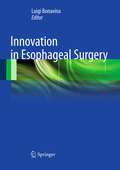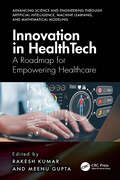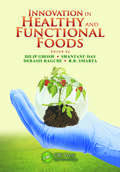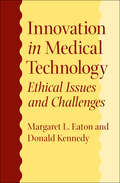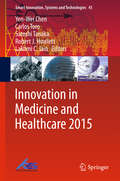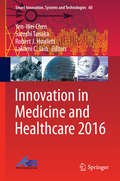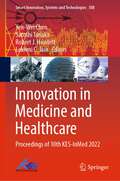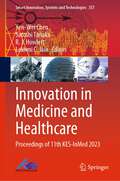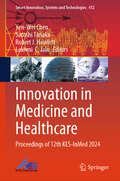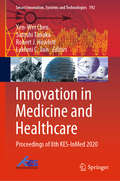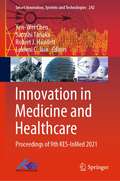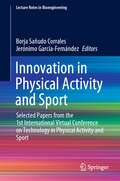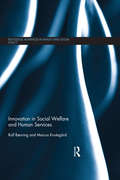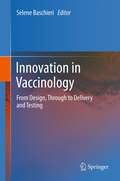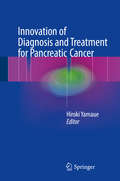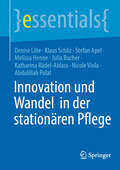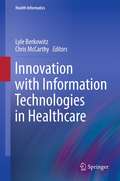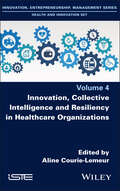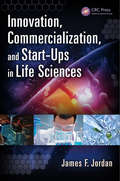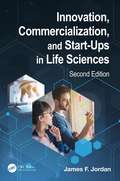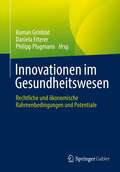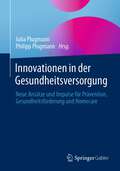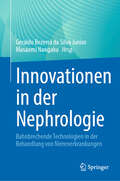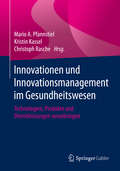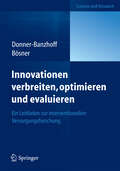- Table View
- List View
Innovation in Esophageal Surgery
by Luigi BonavinaAssessment of surgical innovation is complex. This is especially true in esophageal surgery owing to difficulties in interpreting pathophysiology, staging malignant tumors with accuracy, and standardizing and tailoring the available surgical procedures to the individual patient. This book introduces the general and the thoracic surgeon to the latest developments in esophageal surgery; in each chapter the reader will find a concise background analysis of the topic in question and a state of the art review of diagnosis and treatment. The indications for surgery and the rationale for use of an innovative technique or technology are discussed in detail. Challenging and provocative questions and comments by selected panelists complement each chapter, enhancing the quality of information. Innovation in Esophageal Surgery will be highly informative for both the novice and the expert surgeon wishing to enter the arena of esophageal surgery. A multidisciplinary team of experts offers an evidence-based approach and critical analysis: endoscopic, surgical, and hybrid surgical techniques that will soon change the approach to esophageal disease are described in detail.
Innovation in Healthtech: A Roadmap for Empowering Healthcare (Advancing Science and Engineering through Artificial Intelligence, Machine Learning, and Mathematical Modeling)
by Rakesh Kumar Meenu GuptaSophisticated data analysis is revolutionizing healthcare decision- making, personalized treatments, and operational efficiency. Innovations in HealthTech covers this impact and highlights the significance of robust security measures in safeguarding sensitive medical data and ensuring patient confidentiality. The book provides insights into the development, implementation, and future potential of telemedicine infrastructure. Explores the role of wearable technology in promoting patient engagement and wellness and addressing the critical issue of data security. Offers practical technical insights that provide a deeper understanding of the real-world applications and challenges in the healthcare technology landscape. Examines the role of telehealth and remote monitoring in healthcare accessibility, and use of artificial intelligence in augmenting clinical decision-making processes. Discusses frameworks and guidelines that enable different health technologies and systems to work together seamlessly, ensuring efficient data exchange and improved patient care. Presents the essential measures and strategies in place to protect sensitive healthcare data, ensuring the confidentiality and integrity of information. The text is primarily written for senior undergraduates, graduate students, and academic researchers in the fields of electrical engineering, electronics and communications engineering, computer engineering, and biomedical engineering.
Innovation in Healthy and Functional Foods
by Debasis Bagchi Shantanu Das Dilip Ghosh R. B. SmartaThe focus of food science and technology has shifted from previous goals of improving food safety and enhancing food taste toward providing healthy and functional foods. Today's consumers desire foods that go beyond basic nutrition-foods capable of promoting better health, or even playing a disease-prevention role. To meet this need for innovation,
Innovation in Medical Technology: Ethical Issues and Challenges
by Donald Kennedy Margaret L. EatonThis thought-provoking study examines the ethical, legal, and social problems that arise with cutting-edge medical technology. Using as examples four powerful and largely unregulated technologies—off-label use of drugs, innovative surgery, assisted reproduction, and neuroimaging—Margaret L. Eaton and Donald Kennedy illustrate the difficult challenges faced by clinicians, researchers, and policy makers who seek to advance the frontiers of medicine safely and responsibly.Supported by medical history and case studies and drawing on reports from dozens of experts, the authors address important practical, ethical, and policy issues. They consider topics such as the responsible introduction of new medical products and services, the importance of patient consent, the extent of the duty to mitigate harm, and the responsibility to facilitate access to new medical therapies.This work's insights into the nature and consequences of medical innovation contribute to the national debate on how best to protect patients while fostering innovation and securing benefits.
Innovation in Medicine and Healthcare 2015
by Lakhmi C. Jain Robert J. Howlett Yen-Wei Chen Satoshi Tanaka Carlos TorroInnovation in medicine and healthcare is an interdisciplinary research area, which combines the advanced technologies and problem solving skills with medical and biological science. A central theme of this proceedings is Smart Medical and Healthcare Systems (modern intelligent systems for medicine and healthcare), which can provide efficient and accurate solution to problems faced by healthcare and medical practitioners today by using advanced information communication techniques, computational intelligence, mathematics, robotics and other advanced technologies. The techniques developed in this area will have a significant effect on future medicine and healthcare. The volume includes 53 papers, which present the recent trend and innovations in medicine and healthcare including Medical Informatics; Biomedical Engineering; Management for Healthcare; Advanced ICT for Medical and Healthcare; Simulation and Visualization/VR for Medici≠ Statistical Signal Processing and Artificial Intelligence; Smart Medical and Healthcare System and Healthcare Support System.
Innovation in Medicine and Healthcare 2016
by Lakhmi C. Jain Robert J. Howlett Yen-Wei Chen Satoshi TanakaThis proceedings volume includes 32 papers, which present recent trends and innovations in medicine and healthcare including Innovative Technology in Mental Healthcare; Intelligent Decision Support Technologies and Systems in Healthcare; Biomedical Engineering, Trends, Research and Technologies; Advances in Data & Knowledge Management for Healthcare; Advanced ICT for Medical and Healthcare; Healthcare Support System; and Smart Medical and Healthcare System. Innovation in medicine and healthcare is an interdisciplinary research area, which combines the advanced technologies and problem solving skills with medical and biological science. A central theme of this proceedings is Smart Medical and Healthcare Systems (modern intelligent systems for medicine and healthcare), which can provide efficient and accurate solution to problems faced by healthcare and medical practitioners today by using advanced information communication techniques, computational intelligence, mathematics, robotics and other advanced technologies.
Innovation in Medicine and Healthcare: Proceedings of 10th KES-InMed 2022 (Smart Innovation, Systems and Technologies #308)
by Lakhmi C. Jain Robert J. Howlett Yen-Wei Chen Satoshi TanakaThis book presents the proceedings of the KES International Conferences on Innovation in Medicine and Healthcare (KES-InMed-22), held in Rhodes, Greece, on June 20–22, 2022. Covering a number of key areas, including digital IT architecture in health care; advanced ICT for medicine and health care; biomedical engineering, trends, research, and technologies; and healthcare support systems, this book is a valuable resource for researchers, managers, industrialists, and anyone wishing to gain an overview of the latest research in these fields.
Innovation in Medicine and Healthcare: Proceedings of 11th KES-InMed 2023 (Smart Innovation, Systems and Technologies #357)
by Lakhmi C. Jain Yen-Wei Chen Satoshi Tanaka R. J. HowlettThis book presents the proceedings of the KES International Conferences on Innovation in Medicine and Healthcare (KES-InMed-23), held in Rome, Italy, on June 14–16, 2023. Covering a number of key areas, including digital IT architecture in healthcare; advanced ICT for medicine and healthcare; biomedical engineering, trends, research and technologies; and healthcare support systems, this book is a valuable resource for researchers, managers, industrialists and anyone wishing to gain an overview of the latest research in these fields.
Innovation in Medicine and Healthcare: Proceedings of 12th KES-InMed 2024 (Smart Innovation, Systems and Technologies #412)
by Lakhmi C. Jain Robert J. Howlett Yen-Wei Chen Satoshi TanakaThis book presents the proceedings of the KES International Conferences on Innovation in Medicine and Healthcare (KES-InMed-24), held in Madeira, Portugal, on June 19–21, 2024. Covering a number of key areas, including digital IT architecture in healthcare; advanced ICT for medicine and healthcare; biomedical engineering, trends, research, and technologies; and healthcare support systems, this book is a valuable resource for researchers, managers, industrialists, and anyone wishing to gain an overview of the latest research in these fields.
Innovation in Medicine and Healthcare: Proceedings of 8th KES-InMed 2020 (Smart Innovation, Systems and Technologies #192)
by Lakhmi C. Jain Robert J. Howlett Yen-Wei Chen Satoshi TanakaThis book presents the proceedings of the KES International Conferences on Innovation in Medicine and Healthcare (KES-InMed-19), held in Split, Croatia, on June 17–19, 2020. Covering a number of key areas, including digital IT architecture in healthcare; advanced ICT for medicine and healthcare; biomedical engineering, trends, research and technologies; and healthcare support systems, this book is a valuable resource for researchers, managers, industrialists and anyone wishing to gain an overview of the latest research in these fields.
Innovation in Medicine and Healthcare: Proceedings of 9th KES-InMed 2021 (Smart Innovation, Systems and Technologies #242)
by Lakhmi C. Jain Robert J. Howlett Yen-Wei Chen Satoshi TanakaThis book presents the proceedings of the KES International Conferences on Innovation in Medicine and Healthcare (KES-InMed-21), held virtually on June 14–16, 2021. Covering a number of key areas, including digital IT architecture in healthcare; advanced ICT for medicine and healthcare; biomedical engineering, trends, research and technologies; and healthcare support systems, this book is a valuable resource for researchers, managers, industrialists and anyone wishing to gain an overview of the latest research in these fields.
Innovation in Physical Activity and Sport: Selected Papers from the 1st International Virtual Conference on Technology in Physical Activity and Sport (Lecture Notes in Bioengineering)
by Jerónimo García-Fernández Borja Sañudo CorralesThis book reports on cutting-edge digital technologies and their applications in physical activity and sport. Gathering selected chapters from the 1st International Conference on Technology in Physical Activity and Sport, held virtually on November 24-27, 2020, from Seville, Spain, it offers a practice-oriented and evidence-based perspective on how technologies can be used for evaluation and control of different parameter relating to sport, physical activity, and health. It covers how digital technologies can be applied for training and monitoring purposes, and for improving athlete’s performance, how they influence sport habits in different populations, demonstrating their growing influence in sport businesses (such as fitness centers) and management, and provides new findings on the connection between physical activity and human health, suggesting some interesting directions for future studies. With a good balance of laboratory research and information relevant for professional trainers, this book will provide bioengineers, sport scientists, and physiotherapists with timely information and a multidisciplinary perspective on the use of digital technologies to improve fitness, wellbeing and health in different population groups.
Innovation in Social Welfare and Human Services
by Rolf Rønning Marcus KnutagardInnovation is an oft-heard buzzword in both public and private sectors concerned with the organisation and delivery of services to vulnerable individuals. This thoughtful volume explores what innovation might actually involve in the context of contemporary human services. Highlighting both the importance and utility of innovation but also promoting a more reflective approach, the book distinguishes between innovation and improvement and discusses the relevant differences between private sector, public sector and non-profit organisations. It looks at how innovation is often as much a result of the power relations between the involved actors, and the structural context, as a result of popularly identified ‘drivers’ and ‘barriers’. Including numerous case studies, the book illustrates and explains innovations in welfare services at different levels, looking at the macro level (innovations in social policy), the meso level (innovation at organisational level) and the micro-level (user-driven innovations). Arguing the innovation is nothing new in human services, the authors emphasise the importance of innovation being developed and supported by those working within those organisations. New and creative solutions to problems encountered in everyday work by front-line workers can be taken up to improve services provided and make a difference for the users, rather than change being externally imposed upon them by those without insider knowledge. Innovation in Social Welfare and Human Services is an important read for researchers and practitioners interested in the administration, leadership and organisation of social services.
Innovation in Vaccinology
by Selene BaschieriPrevention of infectious diseases by vaccination is one of the most significant achievements of modern medicine. During the 20th century, the average human life span in the developed world was about 70 years and it is expected to increase, with a significant portion of this increase directly attributed to vaccination. Since the first empiric vaccination trials, knowledge and technology have enormously evolved and new vaccination strategies are emerging on the market. Indeed, in spite of the great success, conventional vaccination strategies sometimes may result ineffective and, above all, may raise safety concerns. The aim of this book is to provide an overview of some of the technology platforms that have been realized or are currently under development to try to address unsolved and new issues in the field of vaccine development. Common denominator of all thematic areas described herein is the multidisciplinary teamwork. Most of the enabling technologies have been established by putting in the "melting pot" expertise in fields that, at first glance, may appear very far apart. I hope that this collection of articles will make the readers aware that vaccinology is rapidly taking a new direction, ceasing to be an empirical science.
Innovation of Diagnosis and Treatment for Pancreatic Cancer
by Hiroki YamaueThis collection of chapters describes in detail the latest insights into the evaluation of resectability and neoadjuvant therapy to pancreaticoduodenectomy and distal pancreatectomy for pancreatic cancer. Shedding light on immunotherapy and gene therapy, this volume comprehensively covers treatments and procedures for the disease, allowing surgeons and trainees to gain an overview and explore innovative treatments. It also provides information on various cases using tools such as endoscopic ultrasound, MDCT, PET for diagnosis and laparoscopy and robotic resection methods. Edited and authored by pioneering professionals, Diagnosis and Treatment for Pancreatic Cancer is a valuable resource for gastroenterologists, medical oncologists, surgical oncologist and general surgeons interested in treatment of pancreatic cancer care.
Innovation und Wandel in der stationären Pflege (essentials)
by Abdulillah Polat Denise Lilie Klaus Schliz Stefan Apel Melissa Henne Julia Bucher Katharina Rädel-Ablass Nicole ViolaDieses essential unterstreicht die dringende Notwendigkeit, auf die dynamischen Veränderungen in der Pflegebranche zu reagieren. Vor dem Hintergrund des demografischen Wandels, des Fachkräftemangels und der steigenden Komplexität von Pflegebedürfnissen sind grundlegende Anpassungen in Strukturen unverzichtbar. Besonders betroffen ist der Bereich der stationären Langzeitpflege, wo innovative Ansätze und nachhaltige Konzepte erforderlich sind. Die Beiträge bieten praxisorientierte Lösungen, beleuchten wissenschaftlich fundierte Wege und liefern wertvolle Erkenntnisse, die den fachlichen Diskurs fördern und zukunftsfähige Reformen unterstützen.
Innovation with Information Technologies in Healthcare
by Lyle Berkowitz Chris MccarthyThis book provides an extensive review of what innovation means in healthcare, with real-life examples and guidance on how to successfully innovate with IT in healthcare.
Innovation, Collective Intelligence and Resiliency in Healthcare Organizations
by Aline Courie-LemeurResilience in healthcare organizations is a complex issue, involving all stakeholders in the healthcare field. It is a highly topical issue, even more so in the wake of the recent health crisis. This book explores the impact of collective intelligence on the resilience of these organizations, and the role played by innovation. Health organizations comprise the structures and systems involved in treating patients, as well as healthcare professionals with medical, social or medico-social expertise, along with institutional and administrative players in the field. Innovation, Collective Intelligence and Resiliency in Healthcare Organizations alternates between theoretical readings and illustrative case studies. Their diversity is the result of their contributors: university researchers, institutional players from healthcare authorities, practicing caregivers in hospital structures or healthcare coordination support systems, and managers of healthcare structures and systems.
Innovation, Commercialization, and Start-Ups in Life Sciences
by James F. JordanInnovation is the translation of a new method, idea, or product into reality and profit. It is a process of connected steps that accumulates into your brand or reputation. However, there can be many pitfalls and wrong turns on the road to realizing this goal. Innovation, Commercialization, and Start-Ups in Life Sciences details the methodologies ne
Innovation, Commercialization, and Start-Ups in Life Sciences
by James F. JordanInnovation is a translation of a new method, idea, or product into reality and profit. It is a process of connected steps that accumulates into a brand reputation required for success. Unlike Fortune 500 companies, whose projects are self-funded, a start-up must simultaneously have a value proposition that attracts a customer (for revenue), investors (for capital), and acquirers (for a liquidity event or IPO). A high percentage of start-ups fail before attaining positive cashflow, due to a variety of reasons that are detailed in this book.Avoiding the pitfalls and wrong turns are the goals of this book. Innovation, Commercialization, and Start-Ups in Life Sciences details the methodologies necessary to create a successful life science start-up from initiation to exit. Written by an expert who has worked with more nearly 500 life science start-ups, this book discusses specific processes and investor milestones that must be navigated to align customer, funder, and acquirer needs. Successful commercialization requires attention to multiple constituents, such as investors, regulators, and customers. Investors require liquidity for their return, which is achieved through selling their stock in a public or private sale. The reader will gain an appreciation for the necessary data, partnerships, and skills needed to create a competitive and sustainable company. The author discusses such specific issues as customer problems, demonstrating sales access, and ensuring intellectual property is impervious to competitive advancement. This book is intended to be suitable for entrepreneurs, venture capitalists, and investors in both business and academic settings. These organizations have specific departments, such as R&D, operations, business development, legal, regulatory, and marketing, that would also benefit from this book.FEATURES Focuses specifically on life science start-ups Examines how to determine a company valuation and future "fundable milestones" Explores how to align regulatory and clinical strategies Discusses intellectual property derived from a university or individual through formation to exit. Reviews how start‐ups must simultaneously meet the needs of multiple constituencies at once: investors, regulators, customers and exit candidates James F. Jordan is an author, consultant, and speaker. He is a Distinguished Service Professor of Healthcare & Biotechnology Management, a former Fortune 100 executive, and a managing director of a venture fund.Access the Support Material: https://healthcaredata.center/ Cover design by Sarah Mailhott.
Innovationen im Gesundheitswesen: Rechtliche und ökonomische Rahmenbedingungen und Potentiale
by Philipp Plugmann Roman Grinblat Daniela EttererInitiatoren von Innovationen im Gesundheitswesen müssen eine ganze Reihe von zum Teil vielschichtigen Herausforderungen meistern – hier gilt es, rechtliche, regulative wie ökonomische Rahmenbedingungen im Blick zu behalten und dennoch alle Potentiale zu heben. Dieses Fachbuch gibt aus verschiedenen Perspektiven einen breiten Überblick darüber, wie Recht und Ökonomie das Gesundheitswesen beeinflussen, prägen und verändern. Dabei werden auch interdisziplinäre Einflüsse von Schlüsseltechnologien wie Künstlicher Intelligenz eingebunden sowie Themen des Datenschutzes und Haftungsfragen analysiert und bearbeitet, die gegenwärtig und zukünftig bei Fragestellungen zu Innovationen bei Medizinprodukten, Medikamenten und Apps eine Rolle spielen. Insofern wagt das Buch über den Status quo hinaus eine Prognose in die weitere Entwicklung des deutschen Gesundheitswesens. Dabei behält es stets auch den Praxisbezug im Blick und verweist auf verschiedene Best-Practice-Beispiele.
Innovationen in der Gesundheitsversorgung: Neue Ansätze und Impulse für Prävention, Gesundheitsförderung und Homecare
by Philipp Plugmann Julia PlugmannWährend Digitalisierung, Innovationen, Forschung und Entwicklung im Bereich Medizintechnik und -produkte und Life Science die Diagnose- und Therapieverfahren verbessern und viele Fortschritte ermöglichen, werden andererseits durch den demografischen Wandel, den zunehmenden Fachkräftemangel, den Druck auf den deutschen Mittelstand und den immer stärker werdenden internationalen Wettbewerb, gesundheitsökonomische Grenzen für die Bezahlbarkeit unserer Gesundheit gesetzt, die Auswirkungen auf Quantität und Qualität der deutschen und europäischen Gesundheitsversorgung haben werden.Deshalb ist es besonders wichtig, rechtzeitig die Innovationspotenziale dieser Branche auszuloten und zu heben. Die Beiträge in diesem Buch zu Themen wie Cybersicherheit, betriebliches Gesundheitsmanagement, personalisierte Prävention, Psychologie, Technologie und Home Care liefern neue Ansätze und Impulse und leiten konkrete Handlungsempfehlungen für etablierte Unternehmen und Start-Ups in der Gesundheitswirtschaft ab.
Innovationen in der Nephrologie: Bahnbrechende Technologien in der Behandlung von Nierenerkrankungen
by Masaomi Nangaku Geraldo Bezerra da Silva JuniorDie Welt durchlebt eine beispiellose technologische Entwicklung, die alle Bereiche, besonders den Gesundheitssektor, beeinflusst. Die vierte industrielle Revolution bringt Neuerungen wie KI, das „Internet of Things“, Gentechnik, 3D-Druck und Robotik, die bereits Teil unseres Alltags geworden sind. Diese Technologien haben die Gesundheitsversorgung signifikant verändert, von elektronischen Patientenakten bis hin zur robotergestützten Chirurgie. Die Nephrologie, eine seit den 1960er Jahren bestehende Disziplin, hat durch Entdeckungen wie die Dialyse und die Nierentransplantation große Fortschritte gemacht. Heute beginnen moderne Technologien wie KI und 3D-Druck, die Nephrologie zu revolutionieren, mit dem Potenzial, die Behandlung von Nierenerkrankungen präziser und patientenorientierter zu gestalten. Das Buch beleuchtet die Anwendung dieser Technologien in der Nephrologie und deren Potenzial, die Versorgung zu verbessern. Es richtet sich an alle in der Nephrologen Tätigen, an Gesundheitsfachkräfte, an Forscher in verwandten Feldern und Medizinstudenten, und zeigt auf, wie diese Technologien die Behandlung von Nierenerkrankungen revolutionieren könnten.
Innovationen und Innovationsmanagement im Gesundheitswesen: Technologien, Produkte und Dienstleistungen voranbringen
by Mario A. Pfannstiel Christoph Rasche Kristin KasselIm aktuellen Gesundheitsmarkt entstehen vielfältige innovative Produkte und Dienstleistungen, die dazu beitragen, die Qualität und Sicherheit der medizinischen Versorgung weiter zu steigern. Voraussetzung für die Entstehung von Innovationen sind Akteure, die Potenziale und Lösungswege aufspüren und den Mut haben kreative Ideen in die Tat umzusetzen sowie ein innovationsfreundliches Klima in Unternehmen. Dazu gehören Handlungsspielräume zum Ausprobieren, Erproben und Experimentieren für Mitarbeiter und auf der Führungsebene eine Akzeptanz für ein gewisses Maß an Fehlschlägen, die bei der Suche nach Lösungen entstehen. Nur so können Innovationen den Ausgangspunkt für den wirtschaftlichen Erfolg von Unternehmen bilden und zur treibenden Kraft in der Gesundheitswirtschaft werden.Dieses Buch stellt Best-Practice-Beispiele vor und zeigt dabei auf, welche Ansätze, Vorgehensweisen und Methoden sich für das Erreichen von unternehmerischen Innovationszielen besonders gut eignen. Zugleich bietet es einen ganzheitlichen Ansatz von Innovationsmanagement für Entscheidungsträger, Praktiker und Wissenschaftler.
Innovationen verbreiten, optimieren und evaluieren
by Norbert Donner-Banzhoff Stefan BösnerDas Buch richtet sich an Wissenschaftler, die sich mit dem noch relativ jungen medizinischen Feld der Versorgungsforschung beschäftigen. Der Leser findet eine gut verständliche und nachvollziehbare Anleitung, um erste eigene Schritte zu gehen. Und der geübte Versorgungsforscher kann das fundierte und durch die reichhaltige Projektarbeit der Autoren reflektierte Wissen nutzen, um neue Ideen zu entwickeln. Methodische Überlegungen zu qualitativen und quantitativen Verfahren werden von zahlreichen Beispielen unterlegt, die es dem Leser erlauben, ein eigenes Vorsorgungsforschungsprojekt zu konzipieren und durchzuführen. Hierbei sprechen die Autoren mögliche Fallstricke auf dem Weg an und ermutigen den Leser, sich auch noch auf der Zielgeraden eine gesunde Portion Selbstkritik zu bewahren. Gute Versorgungsforschung ist wegen der komplexen Materie eben kein leichtes, aber ein durchaus lohnendes Unterfangen.
